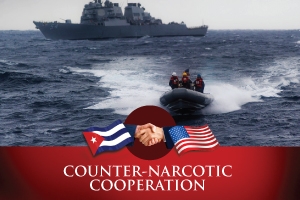You are here: American University Centers Latin American and Latino Studies Cuba Archive - Counter-Narcotics Cooperation
Counter-Narcotics Cooperation Documents
United States and Cuba to Sign Law Enforcement Memorandum of Understanding
(U.S. Embassy in Cuba, January 16, 2017)

The United States and Cuba signed a bilateral Law Enforcement Memorandum of Understanding to solidify their commitment to working together and sharing information to fight crime. The memorandum lists the various issues that it aims to prevent, including terrorism, cyber security threats, human trafficking and migrant smuggling, the trafficking of wildlife, money laundering, the forgery of documents, the transfer of contraband such as firearms and other explosives, and other crimes that fall within the jurisdictions of the two countries. The commitment to collaborate in the prevention, monitoring and investigation of these crimes is part of a series of bilateral agreements between the two countries.
INCS Report 2015: Drug and Chemical Control, Cuba Country Report
(U.S. Department of State, Bureau for International Narcotics and Law Enforcement Affairs, 2015)
The 2015 State Department report on narcotics discusses the status of drug consumption, production, and transit in Cuba. It reports that, due to active policing, strict sentencing, and nationwide prevention and educational programs, drug consumption and production in Cuba remain low despite the island's proximity to major drug exporting nations and the vast U.S. market for illegal drugs. It also discusses Cuba's cooperation with the United States on apprehending and turning over U.S. fugitives and assisting in U.S. judicial proceedings.
In Fight Against Drugs, Cuba and U.S. on Same Team
By Joshua Partlow and Nick Miroff (Washington Post, January 2015)
This article discusses the unlikely partnership between the United States and Cuba on drug enforcement issues. It reports that the U.S. and Cuban government have cooperated on anti-drug crime activities, such as sharing information on the movements of suspected drug boats. Partlow and Miroff suggest that, given the reestablishment of diplomatic relations, the fight against drug smuggling could be a source of further cooperation between the two countries in the future.
INCS Report 2014: Drug and Chemical Control, Cuba Country Report
(U.S. Department of State, Bureau for International Narcotics and Law Enforcement Affairs, 2014)
The 2014 State Department report on narcotics discusses the status of drug consumption, production, and transit in Cuba. It states that, due to active policing, harsh sentencing, very low consumer disposable income, and limited opportunities to produce illegal drugs, drug consumption and production in Cuba remain low despite its location between some of the largest exporters of illegal drugs in the hemisphere and the U.S. market.
INCS Report 2013: Drug and Chemical Control, Cuba Country Report
(U.S. Department of State, Bureau for International Narcotics and Law Enforcement Affairs, 2013)
The latest INCSR report indicates that the Cuban drug strategy has been enormously effective at limiting the sale, import, and consumption of narcotics. Through its increased coastal security measures, Cuba was able to rapidly decrease its capacity to serve as a hub for drug traffickers moving from the Caribbean to the United States. The authors indicate that drug use and export from Cuba is negligible.
Building Bridges in Unlikely Places: U.S.-Cuban Cooperation on Security Issues
By George Withers (Washington Office on Latin America, March 2012)
Many people in the United States, writes Withers, have a dire view of the state of military affairs between the United States and Cuba. So it may come as a surprise that the relations between the U.S. and Cuban militaries are actually quite civil. Moreover, the U.S. Coast Guard and the Cuban Border Guard also work together on several issues of mutual interest. Drug interdiction, migration, and search-and-rescue of people in distress at sea are important issues for the United States and Cuba. Given this common interest, the two organizations have cooperated over time, mostly on a case-by-case basis. There is room for even more cooperation, however.
- United States and Cuba to Sign Law Enforcement Memorandum of Understanding
- 2015 INCS Report: Drug and Chemical Control
- In Fight Against Drugs, Cuba and U.S. on Same Team
- 2014 INCS Report: Drug and Chemical Control
- 2013 INCS Report: Drug and Chemical Control
- Building Bridges in Unlikely Places: U.S.-Cuban Cooperation on Security Issues